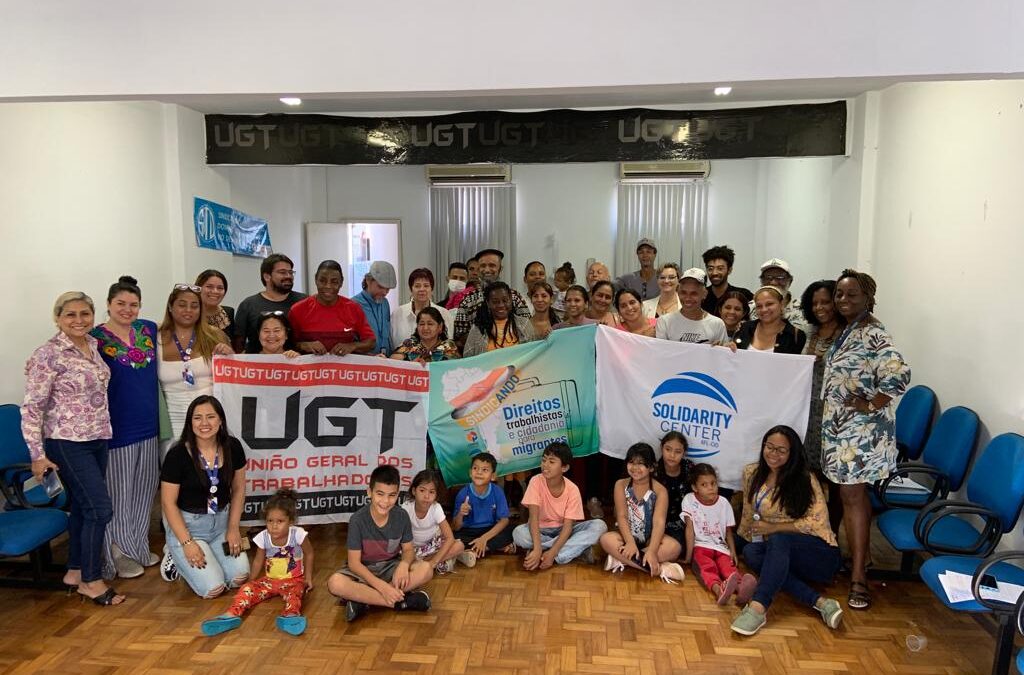
Mar 6, 2023
The Brazilian Ministry of Labor and Employment (MTE) rescued 39 workers, including children, in February from modern slavery in the state of Santa Catarina. Over half of them were Venezuelan migrants who had moved to the state via the government’s Operation Welcome program.
A construction company enticed the workers through social media posts in Venezuela, offering jobs building warehouses and promising good pay, safe work conditions, free housing and meals for the workers and their families. When workers arrived, however, they discovered that their “housing” lacked beds or bathrooms, and they were forced to build their own accommodations, which all of the workers and their families had to share. Meanwhile, none of the workers were provided signed labor documents, which meant they were neither formally hired nor had they access to work benefits.
Around the world, it is not uncommon for migrant workers to be promised decent work for good wages only to find upon arrival to a new country that they have been tricked. Not unlike the rescued Venezuelas, they often face wage theft, unsafe working conditions, abuse and exploitation.
Since 2018, the Solidarity Center in Brazil has worked to connect migrant workers to unions and strengthen collective action. The migration program raises awareness on the specific struggles of the migrant workers, shares best practices and tools with local union partners to increase migrant affiliation, and promotes social dialogue for the development of local public policies on migration through a labor movement perspective.
In recognition of its unique perspective and relationships with partner unions, the Solidarity Center was invited to join a new working group created by the Brazilian Ministry of Justice to discuss and propose a new national migration policy for adoption by the new government. The group held its first meeting March 3.
In partnership with the Center for Human Rights and Immigrant Citizenship (CDHIC) through the SindicAndo project, the migration program led to the 2022 creation of the National Network of Unions for the Protection of the Migrant Worker, which already has more than 80 members among local unions, national trade union centers, federations, confederations and global union federations. The program also supported the General Workers’ Union (UGT) Amazonas branch in the creation of the Venezuelan Association in Amazonas (ASOVEAM), which became an UGT affiliate. As of today, ASOVEAM is the head of the Committee for Migrant and Refugee Policies of Manaus, the capital of Amazonas.
The Solidarity Center, with Brazilian trade union federation CUT’s affiliate, the National Confederation of Construction and Wood Industry Workers (CONTICOM/CUT), is working to strengthen union action and confront and combat precarious work through national awareness-raising and affiliation campaigns in the Combating Precarious Work in the Construction and Wood Sectors. The project has mapped worker rights issues in the sector. According to CONTICOM, workers’ main challenges in the sector are: informal hiring, construction companies not providing personal protective equipment and/or bathrooms, the lack of government inspections of work sites, wage theft and harassment, including harassment.

Workshop on Labor and Social Rights for migrant workers in Manaus (Source: SindicAndo/CDHIC)

CONTICOM’s capacity building workshop on communication (Source: CONTI)

Mar 2, 2023
When teachers in Kosovo went on what ultimately became a five-week strike for better pay and improved classroom resources last autumn, they did so as a last resort, says Rrahman Jasharaj, chair of the teacher’s union, SBSSHK.
“For nine months we tried to negotiate with the government. When the government decides to block the doors and dismiss dialog as a tool for a solution, then there is no other option but striking. And this is very difficult situation for all of us,” Jasharaj said on the latest episode of The Solidarity Center Podcast.

Kosovo teachers waged a five-week strike as a last resort after months of seeking talks with the government. Credit: RTE / RL
With no salary increase for years, “Kosovo teachers can hardly afford their livelihood of their families, and they cannot even manage to pass through from one month to another,” he said.
Jasharaj, who in the late 1990s taught children under heartbreaking conditions during the war, said that while the government indicates it will raise salaries in coming weeks, it has shut out teachers and their unions from salary discussions.
He told Solidarity Center Executive Director and podcast host Shawna Bader-Blau that during the war and again throughout the recent strike, teachers and their unions from around the world, including Education International and the U.S.-based AFT, offered their support and resources.
Ultimately, Jasharaj says, it is essential the government see teachers and their unions as partners in building a first-class education system for Kosovo children.
“We’re trying to establish a mutual cooperation network,” he says. Meanwhile: “My colleagues in all Kosovo schools are currently battling for education only by a chalk, sponge, whiteboard, and lacking basic tools and requisites for conducting the proper teaching process.”
Listen to this episode and all Solidarity Center episodes here or at Spotify, Amazon, Stitcher, or wherever you subscribe to your favorite podcasts.
Download Recent Episodes!
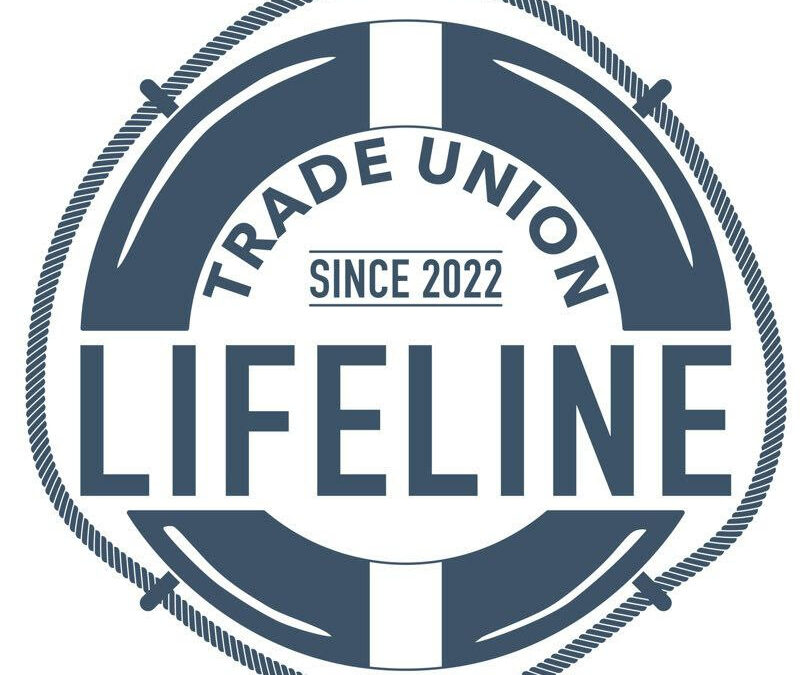
Feb 24, 2023
One year ago, military forces of the Russian Federation invaded Ukraine, launching an unprovoked and unnecessary war.
This war has cost thousands of lives and damaged Ukraine’s social and economic infrastructure, which will take years to rebuild. Russia’s attack on Ukraine is the direct cause of major food shortages and agricultural supply chain disruptions felt most painfully in lower-income countries. Yet, the citizens of Ukraine remain united in their resolve to defend their country, endure constant attacks on their civilian infrastructure, and struggle to keep supplies of grain and necessary goods flowing despite Russian restrictions.
Ukrainian workers and trade unions mobilized to become an integral part of the country’s home front. They not only keep the country’s civilian economy moving in areas like agriculture, railways, electrical utilities, education, health care and public administration, but they have also volunteered their time to meet the country’s humanitarian crisis. Ukrainian unions, including the Federation of Trade Unions of Ukraine (FPU) and the Confederation of Free Trade Unions of Ukraine (KVPU), and a number of independent unions have converted union property into housing for internally displaced people, created supply chains for humanitarian aid and turned union halls and offices into community centers for those in need of assistance.
The Solidarity Center supports these union partners’ humanitarian work as well as their efforts to defend worker rights. Despite the difficulties of war, unions continue to support workers in all areas of the Ukrainian economy with organizing and bargaining support, education and legal assistance, and they continue to defend worker rights in democratic debate at all levels of governance in Ukraine. The staff of the Solidarity Center and its Ukrainian partner Labor Initiatives (LI) continue to assist Ukrainian unions and partners with technical assistance, training and legal aid. In addition, Solidarity Center and LI staff have joined in the humanitarian effort, helping to create the Trade Union Lifeline, a network of unions and activists working to move humanitarian aid to where it is needed the most. The resilience of Solidarity and LI staff, to continue working through the intense stress and violence of the war to forward the mission of the Solidarity Center and the international trade union movement, is notable and praiseworthy.
The Solidarity Center joins with the AFL-CIO in honoring the work of Ukrainian unions and working people and calling for end to the violent invasion of a sovereign nation and for peace, reconstruction and democracy in Ukraine and the region.
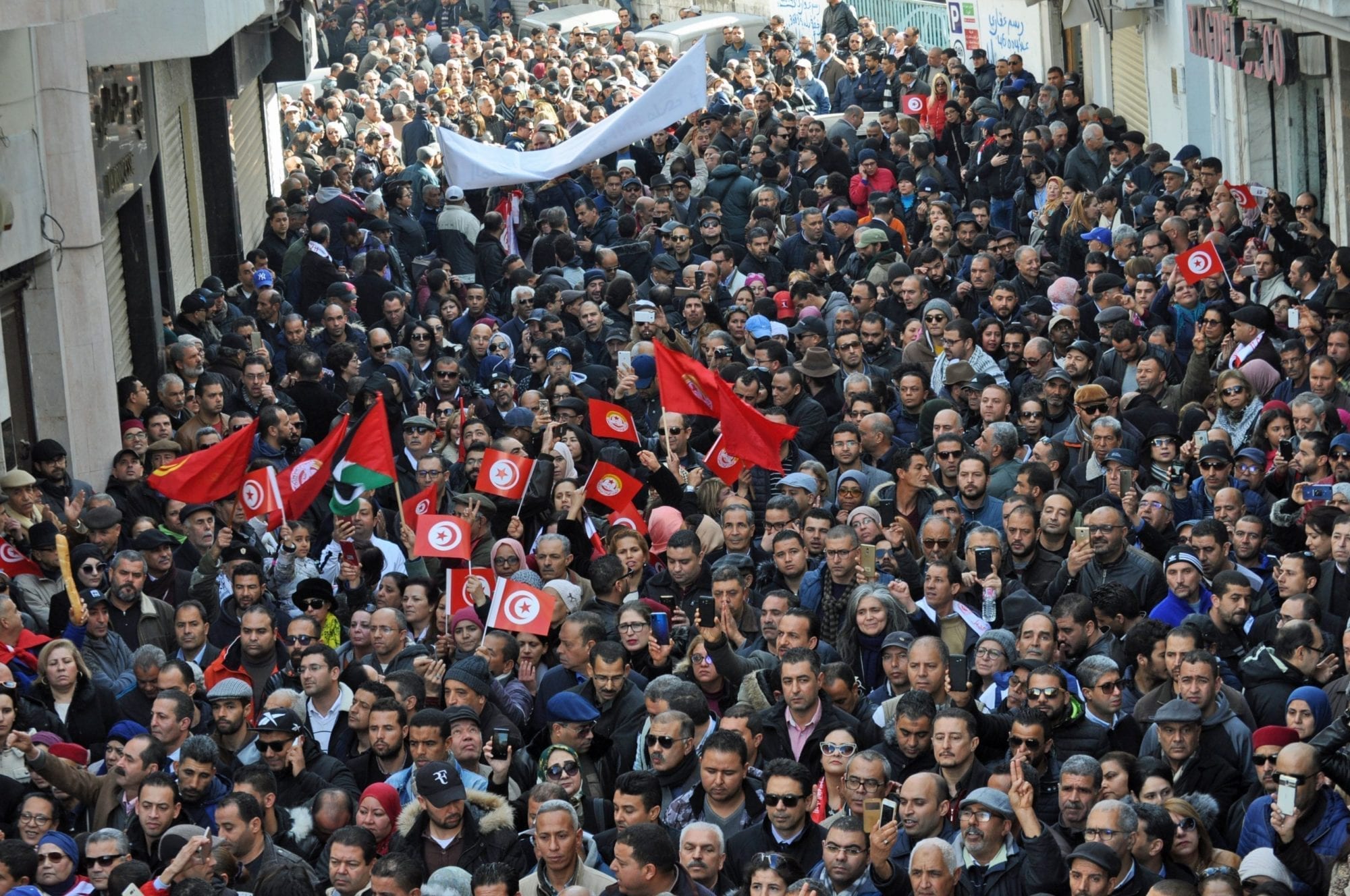
Feb 22, 2023
The expulsion of European Trade Union Confederation (ETUC) General Secretary Esther Lynch is the latest sign of an anti-union, anti-democratic crackdown in Tunisia. Lynch was forced out of the country after speaking at a rally to show solidarity with the Tunisian General Labor Union (UGTT), whose members the government has subjected to a campaign of harassment.
Lynch met with UGTT General Secretary Noureddine Taboubi on Friday prior to taking part in a Saturday rally organized by UGTT in eight cities to protest the stifling “of basic rights, including union rights.” In her speech, Lynch called for the release of Anis Kaabi, general secretary of Tunisia’s highway workers union, who was arrested for organizing a strike of toll booth workers.
Following the protest, authorities posted an article accusing Lynch of breaking the law by threatening the country’s security. Authorities confronted Lynch, giving her 24 hours to leave the country and ordering her to inform them of her activities and anyone she spoke to during that period.
After arriving safely in Brussels, Lynch drew a parallel between her expulsion and the harassment of trade unionists in Tunisia.
“The decision to expel me for taking part in a peaceful protest is typical of the harassment and intimidation faced by trade unionists in Tunisia every day,” she said. “In the past few months, members of the UGTT have been arrested, sacked and spied on simply for carrying out entirely legal trade union work.”
The European Trade Union Confederation issued a statement that decried “the campaign of intimidation and harassment being waged against trade unions,” including arrests, firings, malicious lawsuits, the monitoring and restricting of trade union activity by law enforcement, and the promotion of yellow trade unions. The International Trade Union Confederation noted the “enormous damage to Tunisia’s economy, society and the daily life of working people” resulting from the president’s policies.
Lynch’s expulsion is the latest in a series of anti-union and anti-democratic actions including the arrest of Anis Kaabi and the weaponization of the country’s courts against union members for exercising their rights, such as the freedom to strike.
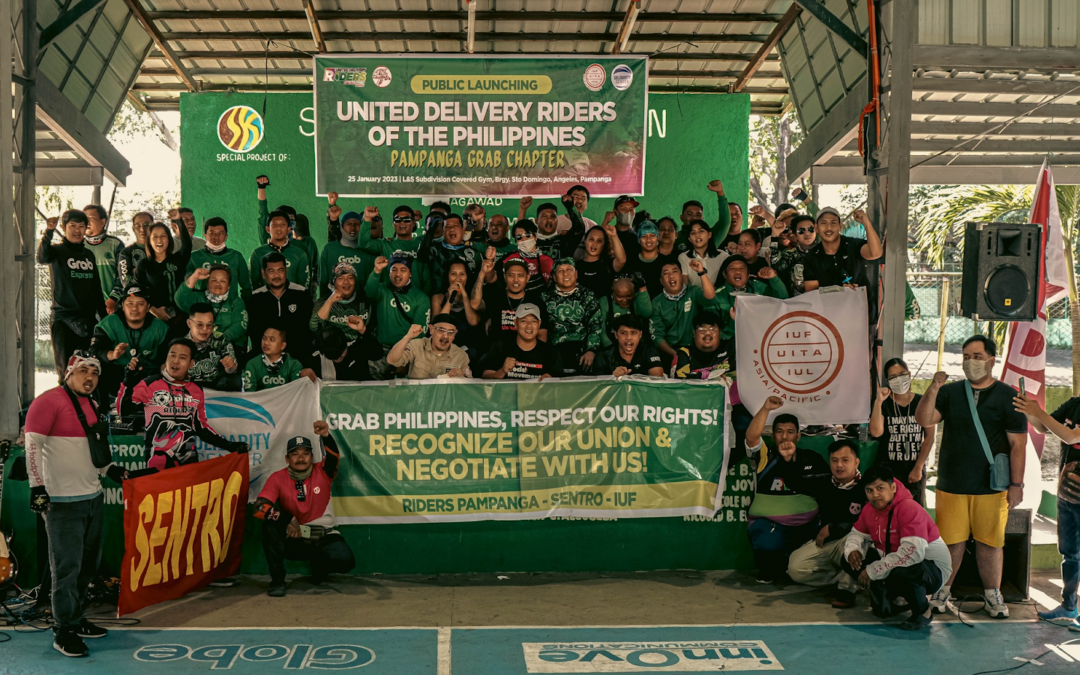
Feb 17, 2023
“Recognize our union; negotiate with us!” Pampanga Delivery drivers cried last January 25 during the launch of the Pampanga chapter of the National Union of Delivery Riders (RIDERS). Intending to cover all platform-based delivery drivers from apps like Grab, FoodPanda and Maxim, RIDERS fights for health insurance and income security, among other basic protections.

Mark Larson (left) and Mary Rose (right)
The Solidarity Center spoke to RIDERS organizers Mark Larson and Mary Rose, who were illegally terminated and suspended last December following a labor rally they both attended. They then filed a case with the National Labor Relations Commission (NLRC) and currently await the labor arbiter’s decision.
Greener Pastures in Delivery Work
“When Grab first opened in Pampanga around June 2019, we were only around 20 drivers,” says Larson.
Larson and Rose were among the pioneer Grab delivery drivers in their province. Before joining, Larson had worked as a fast-food delivery driver, and Rose was a migrant worker in Dubai. Both were enticed to join Grab because it held the opportunity of reasonable wages and flexible work hours. Both Larson and Rose are their respective families’ breadwinners, with Rose being a single mother of five and Larson supporting his family of six.
Mark (left) and Rose (right) are with their family. Faces blurred for privacy.
In the Philippines, apps like Grab utilize a cash-on-delivery system that makes delivery drivers like Larson and Rose temporarily pay for their customer’s food order. The customer then pays the delivery drivers back once they receive their order. This opens up the possibility of fake bookings, such as when the customer never claims the food.
Cracks in the System
Emerging from the pandemic, food delivery services became typical for Filipinos. The delivery boom necessitated Grab to add more delivery drivers. Research conducted in 2022 by Fairwork Philippines estimates that Grab employs 40,000 delivery drivers. Its competitor, Foodpanda, employs 45,000.
However, increasing delivery drivers meant steeper competition, and fewer bookings meant less income. “Before, working late into the night was a choice. Now it is a necessity,” says Rose. “Despite consistent good performance, it is a game of chance— some accounts have stronger bookings on some days and slower bookings on others,” Larson adds.
The incentive system they used before the pandemic was also adjusted. “They may have raised the incentive amount, but they also raised the number of rides you will need to reach it. In the end, the delivery driver loses,” says Rose.
While delivery drivers in Pampanga have been complaining about these issues, the push for collective action came when Grab informed the delivery drivers that they would implement fare changes. On the day Grab Pampanga implemented the announced fare change, Pampanga delivery drivers were shocked to find fares that went below 38 pesos (about 69 cents).
Grab Pampanga’s Pricing Matrix Provided to GrabFood Delivery Drivers, 2022
|
Distance
|
Pax Fare
(old, peso)
|
Pax Fare
(new, peso)
|
Dax Fare
(old, peso)
|
Dax Fare
(new, peso)
|
|
0-1.5km
|
49
|
28
|
51+
|
34+
|
|
1.5-3km
|
49
|
38
|
61+
|
62+
|
|
3-5.5km
|
59
|
48
|
95+
|
73+
|
|
5.5km up
|
79
|
58
|
110+
|
81+
|
Pax refers to the net income of the delivery driver per transaction. Dax is what the customer will pay. The difference between the two (Dax minus Pax) is what goes to Grab. Example computations change the base rate of around 49 pesos (about 89 cents) to 38 pesos (about 69 cents).
The Breakthrough
Larson remembers the anger and confusion that delivery drivers felt when they saw how little they would make, considering that they needed to spend their money on motorcycle maintenance, gas, mobile data and cellular load, and delivery boxes.
 When management informed the delivery drivers of the change in late 2022, it was through a Zoom call where comments were screened and monitored. Grab Pampanga did not seek prior input from delivery drivers. “We also have a Discord channel with the management, but they usually just mute the chat when they don’t want to be bothered,” explains Larson.
When management informed the delivery drivers of the change in late 2022, it was through a Zoom call where comments were screened and monitored. Grab Pampanga did not seek prior input from delivery drivers. “We also have a Discord channel with the management, but they usually just mute the chat when they don’t want to be bothered,” explains Larson.
He continues, “Delivery drivers within their areas started talking to each other, and agreed to do a motorcade and noise barrage. Almost 600 delivery drivers were a part of that first rally.”
At the time, since Larson was the team leader in his area, his fellow delivery drivers asked him to go to the Grab Pampanga management office to communicate their demands. Weeks of negotiating with management proved to be unfruitful. “They told us it was a system error, but they don’t know when it would be corrected. They said their hands were tied because they didn’t have access to the fare matrix. They only follow what the main office tells them,” Larson says.
At that point, the Pampanga management team regarded Larson as the spokesperson of the delivery drivers, specifically those who had rallied. He was given a warning because he allegedly violated the company’s code of conduct and was called to a meeting. Rose, who was present during the rally, was also issued a warning. During their meeting, management purported that Larson was the leader of the rally, and that Rose was wearing Grab’s uniform during the rally. A second meeting was called, which coincided with a planned labor rally. After attending the second rally, Larson was terminated, while Rose was indefinitely suspended.
Call to Action
“Ultimately, they’re [Grab] the ones who pushed us to unionize,” Rose says. Rose and Larson eventually attended orientation seminars and training on trade unionism and worker rights. Together with other delivery drivers, they formed the Pampanga Chapter of the United Delivery Riders of the Philippines (RIDERS).
“We saw that it was the only way for us to fight for our rights. Because if we do it individually, they will never notice us. They would just terminate us, and we would have a hard time fighting back,” says Larson, “At least now that I have a union to support me, I can fight.”
“The number one reason delivery drivers are scared,” Larson says, “is because they believe that they are not employees of the app.” In the Philippines, no specific labor law has provisions for workers in the gig economy. However, a recent ruling from the Supreme Court established an employer-employee relationship between Lazada, an e-commerce platform and its delivery drivers. Larson and Rose are hopeful that this can be the start of future legislation for delivery drivers.
 Larson and Rose’s pending case with the NLRC has yet to be settled. Rose has since been reinstated but continues to fight and organize.
Larson and Rose’s pending case with the NLRC has yet to be settled. Rose has since been reinstated but continues to fight and organize.
When Rose was asked why she continues to fight, she replied, “When you see your dignity being stepped on, you must stand up for yourself. We don’t have laws for us [delivery drivers]. Unionizing is how not only the company but also the government will notice us.”
You may follow RIDERS-SENTRO on their Facebook page for more updates at: https://www.facebook.com/UnitedDeliveryRidersOfThePhilippines
Contact them through Solidarity Center’s office in the Philippines at [email protected], or their email at: [email protected].
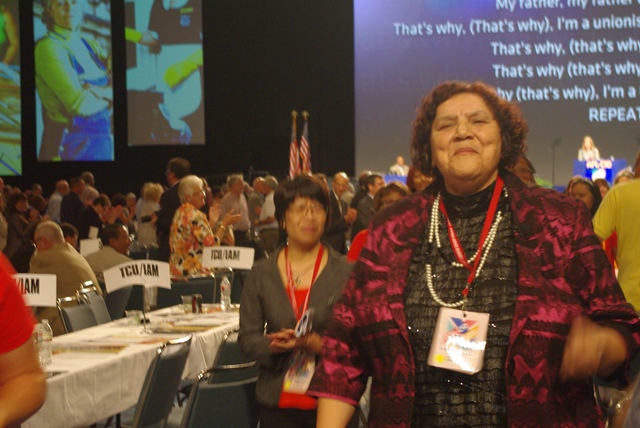
Feb 13, 2023
Myrtle Witbooi, a fierce advocate of domestic worker rights who recently passed away, is remembered in this Solidarity Center Podcast episode by Solidarity Center Domestic Worker Global Lead Alexis De Simone. We also hear from Myrtle herself, as she accepted the AFL-CIO’s Human Rights award on behalf of the International Domestic Worker Federation, which she helped form and led.
“Her deep conviction that when women, when the working poor, when
women of color, when workers in the Global South, when union sisters and brothers decide to join forces, decide that they are in it together, there is no option but victory,” says De Simone.
“That is so much of Myrtle’s legacy.”
Download Recent Episodes!
This episode is a re-broadcast from the podcast, Labor History Today, produced by the Metro Washington Labor Council.












 When management informed the delivery drivers of the change in late 2022, it was through a Zoom call where comments were screened and monitored. Grab Pampanga did not seek prior input from delivery drivers. “We also have a Discord channel with the management, but they usually just mute the chat when they don’t want to be bothered,” explains Larson.
When management informed the delivery drivers of the change in late 2022, it was through a Zoom call where comments were screened and monitored. Grab Pampanga did not seek prior input from delivery drivers. “We also have a Discord channel with the management, but they usually just mute the chat when they don’t want to be bothered,” explains Larson.  Larson and Rose’s pending case with the NLRC has yet to be settled. Rose has since been reinstated but continues to fight and organize.
Larson and Rose’s pending case with the NLRC has yet to be settled. Rose has since been reinstated but continues to fight and organize. 